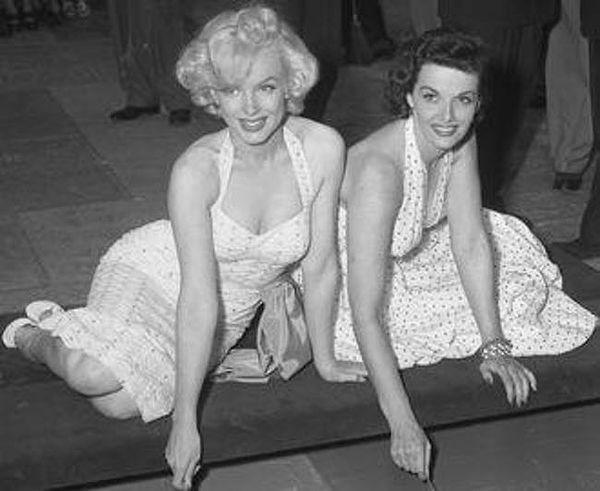Marilyn Monroe died of a barbiturate overdose on August 5, 1962, in her home at 12305 5th Helena Drive in Brentwood, CA. Since then, her death has been the subject of some of the most enduring conspiracy theories in history - including that she was one of many historical suicides that were actually a murder. Yet, the actual details of her demise are just as shocking and interesting as the stories bandied about by conspiracy theorists.
12 Spooky Details You Probably Haven't Heard About Marilyn Monroe's Mysterious Death

1. Marilyn Monroe Died from a Nembutal Overdose but No Pills Were Found in Her Stomach

According to the coroner’s report, Marilyn Monroe overdosed on over 40 Nembutal pills. However, no pills were found in her stomach. Deputy coroner Thomas Noguchi later explained the lack of pills as a result of Monroe’s long history of substance abuse. The pills in her stomach were digested more quickly than they would have been by someone who wasn’t an addict.
Yet, the fact that no pills were found in her stomach has been used by conspiracy theorists through the years to support their theory that perhaps she did not die of an overdose at all, but instead was killed either by the CIA, FBI, or her own housekeeper.
2. Her Autopsy Wasn't Complete Because Her Organs Had Been Destroyed

Dr. Noguchi was tasked with the autopsy, but he wasn't exactly given a complete picture. According to him, when he received Monroe's body in the morgue, the samples from her stomach and intestines were destroyed. This affected toxicology reports, which made Noguchi believe people would think she was murdered.
He also discovered other organs were sent to the toxicology labs, but tests were never done. The only parts of Monroe's body that were put to complete toxicology tests were samples of her blood and her liver.
3. Her Housekeeper Was Found Washing Her Bed Sheets the Night of Her Death
Sergeant Jack Clemmons of the Los Angeles Police Department was the first person to arrive on the scene of Monroe’s death. Later, in his own writings of the event, he recalled that Monroe’s housekeeper Eunice Murray was running the washing machine when he arrived. He also noted that Murray was acting strangely and was evasive when questioned.
Detective Sergeant Robert E. Byron, who arrived on the scene a few minutes after Clemmons, also noted in his report that Murray was acting like an unreliable witness. He wrote:
“It is officer’s opinion that Mrs. Murray was vague and possibly evasive in answering questions pertaining to the activities of Miss Monroe during this time.”
Conspiracy theorists have used Murray’s behavior the night of Monroe’s death as proof that there was something inappropriate and fishy going on, and that perhaps the housekeeper knew more than she was letting on.
4. She Left an Ominous Message Before Her Death
Monroe spoke to several people on the phone the night of her death. Among them was Peter Lawford, an old friend of the actress and the brother-in-law of John F. Kennedy. According to Lawford, Monroe seemed to be under the influence of drugs, and he also claims she told him:
'Say goodbye to Pat [Patricia Newcomb, her publicist], say goodbye to the president, and say goodbye to yourself, because you're a nice guy.'
Lawford became extremely worried about Monroe’s state and phoned several people to check up on her. When he was unable to reach Dr. Greenson he called Monroe’s lawyer Milton A. Rudin, who in turn reached out to Monroe’s housekeeper, who told him that Monroe was fine.
This message, however, has further fueled conspiracy theories that perhaps John F. Kennedy and the government were somehow involved in Monroe’s death.
5. Conspiracy Theories Surrounding the Death Did Not Gain Full Steam Until the 1970s
Norman Mailer’s biography of Marilyn Monroe was one of the first to suggest that foul play was a factor in Monroe’s death. In the 1960s, a self-published biography by Frank A. Capell made claims that Monroe was murdered as part of a communist conspiracy, but it wasn’t until Mailer’s account was published in 1973 that the conspiracy theories really took hold.
Mailer was the first to suggest Monroe had an affair with Robert Kennedy, and that her involvement with him led to her death. He was savaged by critics for his implications and later admitted: “I’d say it was ten to one that [Monroe’s death] was an accidental suicide.”
When questioned as to why he felt the need to bring Robert Kennedy into it, he said:
“I needed money very badly.”
Following Mailer’s accusations against RFK, biographer Robert F. Slatzer in 1975 further argued that Monroe was killed by the attorney general because she threatened to go public with government secrets Kennedy had confided in her.
Also in 1975, journalist Anthony Scaduto published an article alleging Monroe was ordered to be killed by the Kennedy brothers, and that she kept a “red diary” where she supposedly stored secret government information the Kennedys had confided in her.
6. She Went from Happy to Dying in Less Than Thirty Minutes
Monroe took a phone call from Joe DiMaggio, Jr. between 7:00 pm and 7:15 pm and by all accounts had a happy conversation with the 36-year-old, during which DiMaggio, Jr. told her that he’d just broken up with a young woman Monroe disliked. Housekeeper Eunice Murray also later confirmed that Monroe was “happy, gay, alert – anything but depressed” during the talk.
Monroe took her last call of the night from Peter Lawford about half an hour later at 7:40 pm or 7:45 pm, during which Lawford noted she sounded slurred and barely audible.
7. The Police Were Not the First to Be Notified of Her Death
The police weren’t notified of the death until after Monroe's psychiatrist Dr. Greenson and physician Dr. Hyman Engelberg had visited her home. The Los Angeles Police Department was called around 4:25 am, almost an hour and a half from when Monroe was found unresponsive by her housekeeper at 3 am. During that time Eunice Murray, Dr. Greenson, and Dr. Engelberg were alone at the scene.
When Sergeant Jack Clemmons inquired as to why police hadn’t been notified earlier, he was told by Greenson that he “had to get permission from the publicity department at the studio before he could notify anyone.”
8. The Case Was Almost Reopened in 1982
Following the many conspiracy theories published in the 1970s, Los Angeles Attorney General, John Van de Kamp, ordered a review (which spanned 29 pages and took three and a half months to prepare) of the actress’s death in 1982.
After a thorough investigation Van de Kamp found that there was no foul play in Monroe’s death, noting:
''Based on the evidence available to us, it appears that her death could have been a suicide or a result of an accidental drug overdose. It is possible that while her ingestion of a lethal quantity of barbiturates was voluntary, she may have been in such a state of emotional confusion that she lacked a clearly formed purpose.''
The attorney general added that no further inquiry was planned into Monroe’s death and that reopening the case was unnecessary.
9. The Housekeeper's Timeline Changed Frequently
Eunice Murray’s story changed often the night of Monroe’s death. She originally claimed she awoke around 3 am and saw a light under Monroe’s door, which caused her to become alarmed. She said she phoned Dr. Greenson, who arrived a few minutes later.
However, according to Sergeant Jack Clemmons, Murray told him that she phoned Greenson around midnight. She later changed the time to 3 am when questioned by a different detective.
Other people who claimed they were told Monroe had died around midnight were Peter Lawford, who persisted in trying to check up on her after their earlier conversation, and Milton Rudin, her attorney, who was given the news by Dr. Greenson himself.
These discrepancies in time have been interpreted as proof that Greenson and Murray were staging their own cover-up of the actress’s death between midnight and when the police were finally called at 4:25 am.
10. She Was Due to Remarry Three Days After Her Death
Joe DiMaggio and Monroe originally married on January 14, 1954, but their marriage only lasted a short 274 days - they divorced in October 1954. They remained friends through the years, and when Monroe was admitted to a psychiatric hospital in 1961, she turned to DiMaggio to secure her release. According to biographers Norman Mailer and Donald Spoto, the pair was due to remarry on August 8, 1962, three days after Monroe passed away. Following her untimely death, DiMaggio sent roses to her grave several times a week for twenty years.
11. Joe DiMaggio Arranged Her Funeral
DiMaggio was left devastated by Monroe’s death. He arranged the star’s funeral as a very private ceremony with most of her prominent Hollywood friends excluded. People like Frank Sinatra and Peter Lawford were deliberately not invited by DiMaggio, who believed that her Hollywood friends and acquaintances had reduced her to the state that led to her untimely demise. Only thirty of Monroe’s closest friends and relatives, including her half-sister Berniece Baker Miracle, were invited.
Monroe was buried in a green Emilio Pucci dress, and her longtime makeup artist Whitey Snyder made up her face for the last time.
12. After Her Death, Her Friends Fought Over Her Publicity Rights And Royalties
In her will, Monroe said she wanted the bulk of her estate to go to Lee Strasberg, her acting coach. This itself was a point of contention: Monroe's longtime manager Inez Melson said Strasberg tricked her into giving him the estate when it should have gone to her. A judge dismissed her claim, and Strasberg received his share.
Monroe instructed him to give some of her personal effects to close friends and family, as well as maintain her publicity rights and film investments. But, according to some of her friends, he never did. And when he died in 1982, his wife licensed Monroe's likeness and put her personal belongings on display.
The real problems, though, began when Strasberg's wife Anna started selling off belongings that were supposed to go to Monroe's loved ones. Anna Strasberg made an estimated $20 million to $30 million off Monroe's legacy. Despite several lawsuits to stop this, Anna Strasberg was eventually allowed to keep Monroe's rights - and belongings - as part of her former husband's estate.

